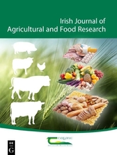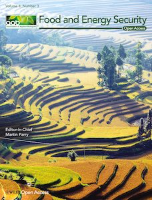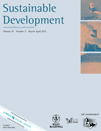
AGRICULTURAL SYSTEMS
Scope & Guideline
Pioneering research at the intersection of agronomy and animal science.
Introduction
Aims and Scopes
- Sustainable Agricultural Practices:
Research on methods and practices that enhance sustainability in agriculture, including organic farming, agroecology, and climate-smart agriculture. - Agroecosystem Resilience:
Studies focused on improving the resilience of agricultural systems to climate change, environmental stressors, and socio-economic challenges. - Integrated Crop-Livestock Systems:
Exploration of synergies between crop and livestock systems to optimize resource use, increase productivity, and improve environmental outcomes. - Digital Agriculture and Innovation:
Investigation into the role of digital technologies, data analytics, and innovation in transforming agricultural practices and enhancing decision-making. - Socio-economic Impacts of Agriculture:
Analysis of the socio-economic dimensions of agricultural systems, including farmer livelihoods, food security, and market dynamics. - Environmental Impact Assessment:
Research aimed at evaluating the environmental impacts of agricultural practices, including greenhouse gas emissions, soil health, and biodiversity. - Participatory Approaches and Stakeholder Engagement:
Focus on participatory research methodologies that involve farmers and stakeholders in the design and implementation of agricultural innovations.
Trending and Emerging
- Climate Change Adaptation Strategies:
There is a growing emphasis on research that identifies and develops strategies for adapting agricultural systems to the impacts of climate change. - Circular Agriculture and Resource Efficiency:
An increased focus on circular agricultural practices that promote resource efficiency, waste reduction, and sustainability in resource use. - Digitalization and Smart Farming Technologies:
Emerging interest in digital technologies, precision agriculture, and data-driven decision-making tools that enhance farm productivity and sustainability. - Agroecological Transitions:
Research exploring the transition towards agroecological practices that prioritize ecological health, social equity, and economic viability. - Food Security and Nutrition-Sensitive Agriculture:
Increasing attention to the connections between agricultural practices, food security, and nutritional outcomes, particularly in light of global challenges. - Systems Thinking and Complexity in Agriculture:
A trend towards applying systems thinking to understand the complexities of agricultural systems and to design interventions that consider multiple factors and stakeholders. - Resilience and Adaptive Capacity in Farming Systems:
Research focusing on building resilience and adaptive capacity in farming systems to better cope with variability and shocks, including economic and environmental stressors.
Declining or Waning
- Traditional Agricultural Practices:
There is a noticeable decline in research focused solely on traditional agricultural practices without consideration of modern techniques or sustainability. - Single Crop Systems:
Research on monoculture practices and their benefits is decreasing as the emphasis shifts towards diversification and integrated farming systems. - Chemical Inputs and Fertilizer Dependency:
Studies that promote high dependency on chemical fertilizers and pesticides are becoming less common, reflecting a growing awareness of the need for sustainable alternatives. - Conventional Livestock Farming Practices:
Research centered on conventional livestock farming without considering integrated or sustainable practices is waning in favor of more holistic approaches. - Static Agricultural Models:
There is reduced focus on static models that do not account for dynamic environmental changes, as researchers increasingly favor adaptive and integrated modeling approaches.
Similar Journals

China Agricultural Economic Review
Driving Excellence in Agricultural and Economic ResearchChina Agricultural Economic Review, published by EMERALD GROUP PUBLISHING LTD, is a premier journal that holds a significant position in the fields of agricultural economics and biological sciences. With its ISSN 1756-137X and E-ISSN 1756-1388, this journal has dedicated itself to advancing academic discourse since its inception in 2008 and continues through 2024. It boasts an impressive Q1 ranking in both Agricultural and Biological Sciences and in Economics and Econometrics, reflecting its high-quality research contributions, as evidenced by its standing in the top percentiles of Scopus rankings (97th and 92nd, respectively). Aimed at fostering scholarly exchange among researchers, professionals, and students, the journal invites original research articles, reviews, and case studies that explore vital issues and developments impacting agricultural economies, with a keen focus on both theoretical and practical advancements. As a well-regarded platform within the United Kingdom, the journal promotes accessibility and encourages significant contributions to enhance the understanding of agricultural economic dynamics worldwide.

IRISH JOURNAL OF AGRICULTURAL AND FOOD RESEARCH
Connecting global minds in agricultural and food studies.Welcome to the IRISH JOURNAL OF AGRICULTURAL AND FOOD RESEARCH, an esteemed publication dedicated to the advancement of knowledge in the fields of agronomy, animal science, ecology, and food science. Published by TEAGASC, this journal has embraced open access since 2015, facilitating the dissemination of groundbreaking research to a global audience. With a robust ISSN of 0791-6833 and an E-ISSN of 2009-9029, the journal ranks in the third quartile (Q3) across multiple categories, highlighting its relevance and influence within the scientific community. The journal aims to serve as a platform for researchers and practitioners to share innovative findings and foster interdisciplinary collaboration to address pressing agricultural and food security challenges. With a focus on empirical and theoretical research, the IRISH JOURNAL OF AGRICULTURAL AND FOOD RESEARCH is vital for those seeking to make significant contributions to these critical areas of study.

Advances in Agriculture
Empowering Agriculture Through Innovative ResearchAdvances in Agriculture is a prominent Open Access journal dedicated to the dissemination of high-quality research in the fields of agriculture, agronomy, animal science, food science, and soil science. Published by HINDAWI LTD from the United Kingdom, this journal has made significant strides since its inception in 2014, contributing to the advancement of agricultural knowledge and practices. With an impressive impact factor reflected in its tiered quartile rankings, notably Q2 in Agricultural and Biological Sciences (miscellaneous), Agronomy and Crop Science, and Animal Science and Zoology, it serves as a key platform for innovative research and applied science. The journal aims to provide researchers, professionals, and students with rich access to groundbreaking studies that can help shape sustainable agricultural practices and policies. Emphasizing a global audience, Advances in Agriculture promotes an inclusive dialogue among scholars to tackle contemporary challenges in agriculture, enhancing food security and environmental stewardship worldwide.

Agricultural and Food Economics
Exploring innovative insights for sustainable food systems.Agricultural and Food Economics is a leading journal published by SPRINGERNATURE, dedicated to the advancement of research in the interconnected fields of agriculture, food systems, and economic analysis. Established in 2013 and operating under an Open Access model, this journal serves as a vital platform for scholars and practitioners to disseminate innovative findings and insights that influence policy and practice. With a notable impact reflected in its 2023 quartile rankings—Q1 in Agricultural and Biological Sciences (miscellaneous), Q2 in Economics and Econometrics, and Q1 in Food Science—this journal is recognized for its rigorous scholarly output. It ranks among the top resources in its domain, with Scopus ranks placing it in the 88th percentile for Agricultural and Biological Sciences and the 79th percentile for Economics. The journal covers a broad spectrum of topics, including sustainable agricultural practices, the dynamics of food markets, and the economic implications of food policies. Researchers, professionals, and students alike will find valuable insights and comprehensive analyses that contribute to the ever-evolving discourse on food and agriculture.

PHILIPPINE AGRICULTURAL SCIENTIST
Advancing Agricultural Science for a Sustainable Future.PHILIPPINE AGRICULTURAL SCIENTIST is a pioneering journal published by the University of the Philippines Los Baños, dedicated to advancing the fields of Agronomy, Crop Science, Animal Science, and Biotechnology. With an ISSN of 0031-7454, this esteemed journal provides a vital platform for researchers and practitioners focusing on agricultural innovations and practices in the Philippines and beyond. With a robust history dating back to 1996 and continuing through 2024, the journal operates within the Q4 quartile, reflecting its potential for growth and impactful contributions in its categories. Despite currently being positioned in the lower ranks, it serves as an essential publishing venue for nascent studies and localized research, contributing to the agricultural discourse. The journal fosters a collaborative research environment, encouraging submissions from both emerging scholars and seasoned experts, making it a valuable resource for students, professionals, and researchers engaged in the agricultural sciences. While it currently does not offer open access, it plays a crucial role in disseminating vital knowledge aimed at enhancing agricultural practices in the region.

NJAS-Impact in Agricultural and Life Sciences
Innovating solutions for sustainable agriculture and environmental health.NJAS-Impact in Agricultural and Life Sciences is a pivotal open-access journal, published by Taylor & Francis Ltd, focusing on the interdisciplinary nexus between agricultural practices and life sciences. Anchored in the United Kingdom, this journal aims to provide a comprehensive platform for the dissemination of innovative research that addresses critical challenges in environmental sustainability, agricultural productivity, and biological advancements. With its inaugural issue dated from 2023 to 2024, NJAS prominently features the latest empirical studies, reviews, and theoretical contributions that enrich existing knowledge and provoke thought among researchers and practitioners alike. Although currently ranking within the lower percentiles across various Scopus categories, the journal aspires to establish itself as a significant contributor to the dialogue on agricultural and environmental sciences. As scholars in these fields seek to bridge the gaps in understanding, NJAS invites submission from diverse perspectives, underscoring the importance of collaborative knowledge-building in addressing the complexities of our changing global landscape.

Food and Energy Security
Innovating the Future of Food Systems and Renewable EnergyFood and Energy Security, an esteemed journal published by WILEY, is dedicated to advancing the fields of food science, agriculture, and renewable energy. Since its inception in 2012, this open-access journal has provided a platform for groundbreaking research and innovative practices that address global challenges related to food production and energy sustainability. With an impressive impact factor reflected in its Q1 quartile rankings across notable categories such as Agronomy and Crop Science and Food Science, this journal is instrumental for researchers and practitioners alike who are focused on enhancing food security and promoting sustainable energy solutions. The journal's scope encompasses multidisciplinary approaches and encourages submissions that explore the intersection of food systems and energy dynamics, ensuring relevance in the evolving landscape of environmental science and policy. By offering open access to its publications, Food and Energy Security commits to making vital research accessible, fostering informed dialogue and collaboration among scholars, policymakers, and the agrifood industry worldwide.

Ecosistemas y Recursos Agropecuarios
Elevating discourse on sustainable development and resource stewardship.Ecosistemas y Recursos Agropecuarios is a distinguished academic journal published by the Universidad Juárez Autónoma de Tabasco through its Dirección de Investigación y Posgrado. Established in 2001, this journal has embraced the Open Access model to ensure that vital research in agriculture and environmental sciences is accessible to a broader audience, fostering knowledge sharing and collaboration globally. The journal's mission is to publish high-quality, peer-reviewed research that advances the understanding and management of agroecosystems and natural resources, making it a key resource for researchers, professionals, and students involved in related fields. Located in Villahermosa, Tabasco, Mexico, the journal's commitment to addressing pressing regional and global challenges in agriculture and sustainability enhances its importance in today’s academic landscape. With an emphasis on innovative solutions and interdisciplinary approaches, Ecosistemas y Recursos Agropecuarios plays a critical role in enriching the discourse on sustainable development and resource management.

SUSTAINABLE DEVELOPMENT
Empowering Research for a Greener FutureSUSTAINABLE DEVELOPMENT is a premier academic journal published by WILEY, dedicated to the dynamic fields of Development, Renewable Energy, and Sustainability. With a strong commitment to advancing knowledge, this journal holds an impressive impact factor that places it in the Q1 quartile in both the Development and Renewable Energy categories for 2023, underscoring its significant influence in the social sciences. Boasting a Scopus rank of 4th out of 306 in Development and 26th out of 270 in Renewable Energy, it reflects a high level of scholarly excellence and relevance, achieving percentiles of 98th and 90th, respectively. Established in 1993, and set to continue through 2024, the journal serves as a crucial platform for researchers, professionals, and students to share groundbreaking insights and foster interdisciplinary dialogue. Although not an open-access journal, it offers a wealth of essential research that addresses the pressing challenges of sustainable development, contributing to a more sustainable future.

Agronomy for Sustainable Development
Driving Change in Agronomy for a Sustainable WorldAgronomy for Sustainable Development, published by SPRINGER FRANCE, is a leading international journal dedicated to advancing the field of agronomy and sustainable practices. With its ISSN 1774-0746 and e-ISSN 1773-0155, this esteemed journal plays a pivotal role in disseminating cutting-edge research and innovative solutions that address critical challenges in agriculture and environmental engineering. Achieving remarkable rankings in Scopus—specifically, 19th out of 406 in Agronomy and Crop Science and 22nd out of 197 in Environmental Engineering—underscores its prestige, with a remarkable 95th and 89th percentile respectively. The journal is open access, promoting broader dissemination of knowledge, and welcomes contributions that foster sustainable agricultural practices and enhance environmental stewardship. As an essential resource for researchers, professionals, and students, Agronomy for Sustainable Development serves as a platform for interdisciplinary collaboration aimed at nurturing resilient agricultural systems and promoting sustainability worldwide.